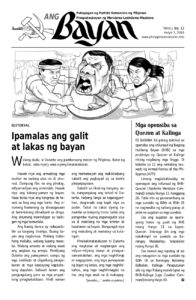Violence and the toxic condition at Pepmaco

MORE THAN 200 workers of Peerless Products Manufacturing Corporation (Pepmaco) were beaten with truncheons, hosed down, and stoned by 20 goons while they were sleeping at their camp in front of the factory in Calamba, Laguna last June 28, 1:00 a.m.
The attack was perpetrated to disperse the striking workers and their picketline. Twelve workers were seriously wounded. The goons also demolished the workers’ hut and properties, including the food they stored, and stole their personal belongings.
Pepmaco is a soap and shampoo manufacturing company that produces Champion, Hana and Calla. It is owned by capitalist Simeon Tiu. From 2013 to 2016, Tiu partnered with Lion Corporation, the biggest manufacturer of toothpastes in Japan that produces Systema which is also distributed by Pepmaco. Pepmaco workers also produce surfactant chemicals which are supplied to transnational companies Procter and Gamble at ACS, and are exported to other countries.
Struggles of the PWU
Pepmaco workers started their protests last year. They founded the Pepmaco Workers Union (PWU-NAFLU-KMU) in January 2018 and launched a campaign against widespread contractualization, low wages, lack of benefits and unsafe working conditions. Their struggle intensified as they mounted their strike last June 4.
The company illegally terminated 64 workers, including union leaders, since the campaign was launched.
In September 2018, an investigation by the Department of Labor and Employment reported that Pepmaco is extensively implementing contractualization in the form of job outsourcing. To avoid its legal obligations and lower its labor costs, the company is indirectly employing its workers through third-party manpower agencies such as Luxor Manpower, VMS and JER Human Resources Corp.
Cheap wages, toxic condition
Of its 500 workers, 400 are agency-hired contractuals and 50 are directly-hired contractuals. Meanwhile, only 50 workers are regular, mostly supervisors and chemical engineers who do not directly participate in production.
Majority of the workers have been working for PEPMACO for 10-15 years, but have remained underpaid contractuals. They are compensated with a measly P373-P400 daily wage. This amount only increases as they are forced to do overtime work for four hours everyday.
A research conducted by the union exposed that 15 workers are capable of producing P2.3 million worth of soap within a span of 12 hours. Of this value, only P13,000 is collectively received by the workers as compensation.
They also have no benefits. Even their contributions to the SSS, PhilHealth and Pag-ibig are not remitted by the company. Pregnant workers are forced to resign.
On top of this, it was also exposed that the company is violating occupational health and safety standards. In its factories, toxic chemicals used for producing soap are handled with bare hands and inhaled by the workers as they are not provided with any safety gear. As a result, workers commonly suffer from skin injuries, itchy and red eyes, and breathing difficulty. The factory also has no clinic, signages and fire exit.

